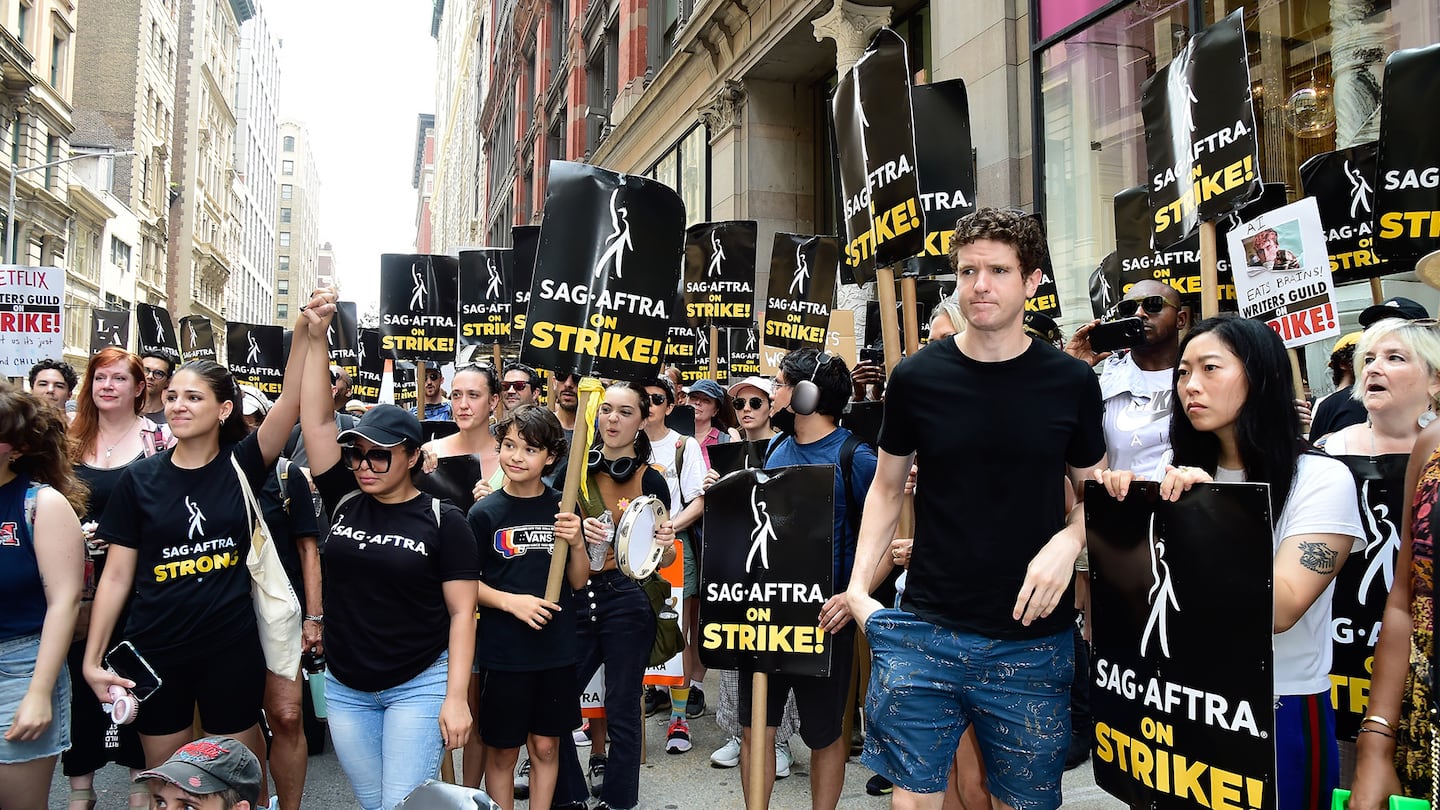
The Business of Fashion
Agenda-setting intelligence, analysis and advice for the global fashion community.

Agenda-setting intelligence, analysis and advice for the global fashion community.

It was the most talked-about red carpet press tour since the pandemic — until it wasn’t.
After years of buzz, the Barbie movie was days away from its July 21 theatrical release. Its star, Margot Robbie, made countless headlines for her press tour wardrobe, a series of ensembles recreating the doll’s most iconic looks created with her stylist Andrew Mukamal.
But all that came grinding to a halt on July 14, as SAG-AFTRA, the actor’s union, announced its first strike in decades. Thousands of SAG members joined the Writer’s Guild of America, the union for screenwriters in the entertainment and media industries, who had been striking since early May. Together, the two groups have effectively shut down Hollywood.
Beyond sound stages and film sets, the actor’s strike will have a profound impact on other arenas of the entertainment industry, such as red carpet appearances and promotional events, which employ thousands of other workers such as stylists and makeup artists who are not union members, but whose income streams will also dry up as a result of the labour dispute.
ADVERTISEMENT
For brands, the strike poses a similar problem; many labels rely on the red carpet as a marketing tool. A number of big fashion players have made their own major investments in the entertainment industry. Gucci and Ralph Lauren are among labels that have staged shows in Los Angeles in recent years, while Saint Laurent launched an entire production studio in April, tapping filmmakers Pedro Almodóvar and David Cronenberg for its first projects.
“Most brands on the red carpet are billion-dollar brands, so I think [the] larger companies will be fine overall but definitely missing big opportunities for brand awareness,” said Tahirah Hairston, fashion writer and brand consultant.
However, the work stoppage presents an opportunity as well. Actors may not be able to work on or promote their films and television shows, but they can still take on non-entertainment jobs — including modelling and commercials for fashion, beauty and lifestyle companies. And attending fashion events will be an easy way to stay in the spotlight while the red carpet and nightly talk shows are dark.
“My immediate thought was, ‘Wow, it’s going to be so great for the talent agencies,’” said one veteran executive in the modelling world. “All of these actors from the fill-in-the-blank show will try to do campaigns this summer and get in some work.”
For the first time in more than 60 years, Hollywood has effectively shut down. Last week, members of the SAG-AFTRA union, which represents 160,000 actors and media professionals, walked off their film sets and stages to form picket lines in Los Angeles, New York and other major American cities.
The strike comes after SAG-AFTRA’s negotiations with the Alliance of Motion Picture and Television Producers, the entity acting on behalf of movie studios and streaming services, hit an impasse. The two parties were not able to agree on the terms of a new three-year contract, and SAG members voted almost unanimously for a strike.
The actors, joining screenwriters who went on strike in May, are demanding what’s called “residual payments” from the likes of Netflix and Apple TV. These payments are like royalty checks: Before the age of streaming, actors and writers would be paid when their shows are rerun on television, creating a steady income between projects. As streaming has become a dominant force, however, these payments have dried up, union leaders say.
Streaming has “undercut performers’ residual income, and high inflation has further reduced our members’ ability to make ends meet,” SAG-AFTRA chief negotiator Duncan Crabtree-Ireland said in a press conference Thursday.
ADVERTISEMENT
Additionally, union members are pushing for guardrails against the use of AI, which actors say could be used to create their digital likenesses or alter their performances without compensation. Writers, meanwhile, are concerned that generative AI services like ChatGPT will be used one day to replace their work.
Under the SAG-AFTRA strike rules, actors are prohibited from filming, promoting their work and appearing at premieres. They cannot seek new work via auditions or readings.
Actors are, however, still allowed to do work outside the realm of film and television production, including fashion advertising — both still images and video. They can also continue with brand partnerships as long as they don’t promote their acting-related projects.
Because they won’t be receiving income from their primary jobs, SAG members could be more likely to seek out this type of work. For fashion, beauty and lifestyle companies, this means they’ll have their pick of a new celebrity ambassador or face of a campaign.
The lack of red carpets will force a pivot for brands that use these events as major marketing moments for their brands — already, the Venice and Toronto film festivals and September’s Emmy Awards are in jeopardy. Though it’ll be a shift for major fashion houses, it likely won’t deeply impact their bottom line, said Micaela Erlanger, a stylist who has worked with stars like Lupita Nyong’o and Meryl Streep, adding that few brands solely rely on the red carpet as their source of income or only marketing channel.
As for stylists and makeup artists, their work will likely suffer without a pipeline of big splashy events for new movies and shows. Those workers may not be part of either striking union, but their work is intrinsically linked to actors’. They’re not only out of work, but they’re also not at the negotiating table.
“By missing all of these big red carpet promo opportunities, this also means that stylists, makeup and glam teams will be out of work, even if it won’t necessarily hurt the brands,” said Tahirah Hairston, writer and brand consultant.
Erlanger said that while the strike means a loss of traditional work, there are other opportunities, particularly involving fashion-centric events. With movie premieres, film festivals and award shows off the table for actors; they may flock to fashion week for a dose of publicity and glamour, potentially providing New York Fashion Week with a much-needed boost, she suggested.
ADVERTISEMENT
Coming off of the pandemic, when stylists were already forced to get creative with virtual appearances and award shows, stylists are more used to thinking outside of the classic red carpet formula than they were five years ago.
“This is in many ways another instance where we’re going to have to reinvent what it means to style talent and nurture designer relationships,” she said.
Regardless of the outcome, the strike is the latest flashpoint in a resurgent US labour movement.
After declining in power following their mid-20th century peak, unions have regained popularity in the past decade, reaching an approval rating of 71 percent last year among Americans, according to polling firm Gallup. Workers in industries that have had minimal union presence in the past, including Starbucks baristas and Amazon warehouse workers, have voted to organise.
Organised labour has become prevalent in fashion media too, including hundreds of media professionals under Condé Nast coming together to create a union last year.
Fashion’s own treatment of workers is coming under scrutiny as well. In September 2021, California Governor Gavin Newsom signed into law The Garment Worker Protection Act, which guarantees hourly wages for garment workers and holds brands accountable for labour violations at partner factories.
In New York, state legislators have introduced the Fashion Workers Act, which would regulate management companies so that models, stylists, makeup artists and other behind-the-scenes creative professionals in fashion are able to negotiate their own contracts with brands and are protected from exploitation.
Some in the industry are hopeful that the high-profile nature of the actors’ strike will help improve working conditions for people in less visible positions — many of whom have a connection to fashion and beauty.
“Whether it’s the writers writing a script, the actors fulfilling a role and lending their name and likeness, or the stylist helping promote the movie and gain success at the box office, we are all integral to the success of the studios,” said Erlanger. “I just hope that across the board, this enacts very real change in the long-term.”
The Cannes film festival is no stranger to high fashion. Entrance-making gowns and jewels are almost mandatory, particularly after the luxury jeweller Chopard redesigned the festival’s highest prize, the Palme d’Or, in 1998.

Diana Pearl is News and Features Editor at The Business of Fashion. She is based in New York and drives BoF’s marketing and media coverage.

Cathaleen Chen is Retail Correspondent at The Business of Fashion. She is based in New York and drives BoF’s coverage of the retail and direct-to-consumer sectors.
Calvin Klein’s chief marketing officer Jonathan Bottomley speaks to Imran Amed about the strategy behind the brand’s buzzy Jeremy Allen White-fronted campaign.
Often left out of the picture in a youth-obsessed industry, selling to Gen-X and Baby Boomer shoppers is more important than ever as their economic power grows.
This month, BoF Careers provides essential sector insights to help PR & communications professionals decode fashion’s creative landscape.
The brand’s scaled-back Revolve Festival points to a new direction in its signature influencer marketing approach.